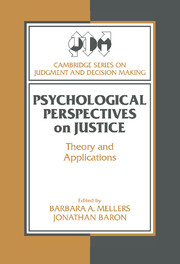Postscript
Published online by Cambridge University Press: 24 October 2009
Summary
Inequity and injustice are not trivial. Some couples spend more money on a single meal in a restaurant than hundreds of millions of families earn in an entire year. People are jailed and tortured in one country for saying what, in another country, might get them elected to office. We are disturbed by inequity, but our disturbance is uneven. We are sometimes more upset by small violations, especially when they are close at hand, than by apparently much greater ones farther away.
Our collective judgments of equity and inequity will play a large role in determining what is done and not done, which inequities are remedied and which are not. Past psychology has demonstrated that judgments of equity do affect our actions, whether these judgments concern two people together in the laboratory or mass political movements. In the future, such judgments will be no less important, as the world grapples with problems of how to distribute the costs of global warming, environmental destruction, and population growth.
The essays in this book represent a new approach to the study of equity judgments. The authors are committed – to varying degrees, to be sure – to an approach that can loosely be called behavioral decision theory. One prominent feature of this approach is a concern with normative models, idealized standards of judgment or decision making. Researchers in this tradition take various positions on the role of such models, as I shall discuss shortly, but we all have something to say about them.
- Type
- Chapter
- Information
- Psychological Perspectives on JusticeTheory and Applications, pp. 315 - 330Publisher: Cambridge University PressPrint publication year: 1993
- 2
- Cited by

